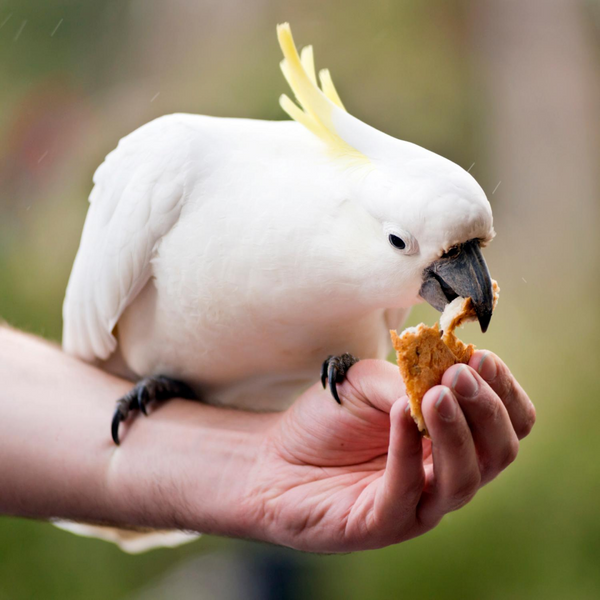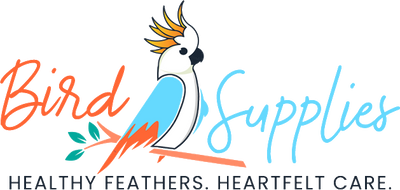Revised May 15, 2022
We've all been there. Your bird needs to take a supplement or medicine and you can't get them to take it. Or, you buy a new supplement for your parrot and the bird won't touch it.
Parrots can be extremely picky eaters. Parrot supplements taste and look different. When you sprinkle a bird supplement like FeatheredUp! on food, your bird is sure to notice and he may even turn up his beak as if to say, "Get that S*#% away from me! A lot of people have trouble with this. So what do you do?
Parrots don't have exceptionally good taste. They only have 30% of the taste buds that we have. That's why they can eat super hot peppers without difficulty. So, it's not the flavor that is the problem. They don't have a great sense of smell either.
The problem is that parrots instinctually avoid foods unless they've been taught that the food is safe. They visually assess the food to determine if it looks familiar before eating it.
There are a couple of ways to get your pet to take to a bird supplement like UnRuffledRx Featheredup! or, any other supplement or medicine, for that matter. All it takes is a little training.

Shutterstock used under license
1. Sprinkle Powdered Bird Supplements or Medicine On Your Bird's Food
First, you can condition your parrot to eat the supplement sprinkled on warm, moist food, such as a mixed vegetable or sweet fruit. Birds are drawn to warm, moist food. After all, it brings fond memories of Mom and Dad's feeding them.
The advantage of this method is that your bird should be eating vegetables and fruits any way. FeatheredUp! and other powdered bird supplements stick to moist food, so you know your bird is eating it.
As your bird becomes accustomed to the look and taste of the food, you can start sprinkling more and more on until you reach the recommended dosage that your bird should consume.
Needed Supplies: Frozen Mixed Veggies or Bird Chop
- Warm approximately 1 Tablespoon of mixed vegetables or chop in the microwave.
- Go over to your pet, and eat one vegetable at a time, as your bird watches. The trick here, is to act like they are incredibly delicious! As your pet watches you eat the warm food mix, act very excited and animated as if each bite is the most delicious thing you've ever tasted. Keep this up without sharing with your bird.
- Show your bird the food up close, but don't let it have some just yet. If your bird stretches its neck to get a nibble say, “No it's just for me!” Your bird has to make the association that these vegetables are the most delicious thing on the planet. So, let the anticipation build!
- Spend several minutes with very animated eating. Your bird doesn't know this, but you're modeling that this vegetable is good and safe to eat.
- Finally, when your bird is begging so badly for a bite - give in. As your bird eats those first several bites, continue eating along with him, still oohing and aahing about how delicious and wonderful this mix is. Repeat this process several times throughout the day just.
- Once your bird is excited about eating the warm food, sprinkle just a pinch of FeatheredUp! or other powdered bird supplement on moist food.
- Sprinkle just enough of the supplement so that your bird gets accustomed to the look, feel, and taste of the product.
- Now you can slowly increase the amount of supplement to the recommended dosage on the product label.
2. Syringe Feed Bird Supplements Mixed With Baby Food Or Baby Juice Found At Your Local Grocery Store
The second way that you can get your bird to take medicine or a bird supplement is to mix it in juice or baby food and deliver it from a syringe.
The advantage of this method is that this is it is a great way to know that your bird is getting the recommended dosage. Plus it's a bonding experience, if properly trained.
The disadvantages? It is a little more time consuming to give the bird medicine. Plus, you have to take it slow and point the tip of the syringe toward the upper beak so that your bird has time to swallow without choking.
Depending on how to tame your bird is and its temperament, it's possible to train your hand fed bird to accept a new supplement in as little as one day

Shutterstock used under license
Let's look at how to teach your bird to take supplements or medication from a syringe. The learning process is very similar to that described above.
Build curiosity, make it fun for your bird, as if he's engaging in flock behavior. Finally, reinforce (reward) the desired behavior of consuming the supplement.
Needed Supplies: Parrot friendly fruit juice, like a non-citrus mango peach blend or an organic baby food like Happa Organic Baby Food Fruit Puree and two syringes.
- Just like above, get your bird used to taking the unmedicated food first. Fill the syringe with the favorite fruit mix and keep it all to yourself. Squirt it in your mouth in a very animated way, like it's the best thing you've ever tasted.
- Again, do this over and over again until your parrot is begging for a taste. However, don't give in too fast! Make sure that your parrot really wants in on the feast. Let the anticipation build!
- Finally, when it seems that your parrot just can't take it anymore, give in. Give him a taste! And, continue your own feast with lots of animation and excitement. You want your parrot to think that you two are the luckiest pair on Earth for having been given this wonderful treat.
- Stop each training session after about 5 minutes. Repeat training sessions a few times a day until your bird is eagerly anticipating sharing this delicious treat with you. Once your bird reliably gets eager when you pull out the syringe and baby food, start adding in a small amount of the supplement.
- Once your bird reliably gets eager when you pull out the syringe and baby food, start adding in a small amount of the supplement. Your parrot may notice the taste difference. Maintain the skill of how to take medicine from a syringe by feeding unmedicated food from a syringe every few months.
Pro's: You know how much medicine your bird is getting
Con's: You have to be very careful to not cause your bird to aspirate. Squirt into the upper beak and at a slow pace so that your bird has time to swallow without choking.
3. Mix Medicine With Organic Baby Food Or Fruit Juice And Pour it From A Cream Pitcher
I only recommend this method for large birds, over 600 gm.
This is very similar to the syringe method, only you slowly pour the mixture into the birds mouth. I used this method with Peachy when he required medications for 3 months. I went slow and did NOT hold his head, but allowed him to back away, if desired.
Again, use the same precautions. Give just a little at a time and allow your bird to back away.
As a side note, you'll want to pre-teach your preferred method and reinforce it often. You never know when you'll be in a situation in which you have to teach your bird to take medicine so pre-training for taking medicine will get you off to a good start fast, next time your bird gets sick.
Related Posts:
Choosing Bird Treats, Supplements, and Vitamins
5 Best Supplements To Support Your Bird's Nutritional Needs
8 Critical Vitamins For Vibrant Bird Feathers
Diane Burroughs, LCSW is a licensed psychotherapist trained in ABA therapy techniques. She specializes in avian anxiety disorders and is certified in Nutrition For Mental Health. Diane has written a number of bird behavior books and she offers behavior consultations. She's developed a range of UnRuffledRx Science-backed Parrot Wellness Supplies.
Diane's products have been featured in the Journal of Avian Medicine and Surgery and at Exoticscon, a conference for exotic pet veterinarians. Her bird collars & supplements are stocked in avian vet clinics and bird stores throughout the US. With over 30 years in the field of behavior, Diane has created thousands of successful individualized behavior plans that help pets thrive.
TAGS: #BirdMedicines #BirdMedications #BirdSupplements
SHARING IS CARING! PLEASE SHARE ON YOUR FAVORITE SOCIAL MEDIA NOW!





